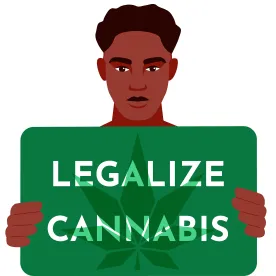We are close to the end of the 2023 Minnesota legislative session, and the legislature has left employers in the weeds with all the drastic changes. Namely, the legislature sent Minnesota’s recreational marijuana bill to Governor Tim Walz’s desk for his signature. Governor Walz previously noted his support for the bill, and it is expected that he will sign it into law in the near future.
Quick Hits
- House File 100 permits individuals at least twenty-one years old to possess, transport, grow, and consume marijuana.
- Unless otherwise required by law, employers must not refuse to hire a job applicant solely because the job applicant submits to a cannabis test and the results of the test indicate the presence of cannabis.
- However, cannabis is still considered a “drug” for employees in “safety-sensitive positions.” Employees in these roles would be subject to drug testing for cannabis under the bill.
Subject to various restrictions, the bill, House File (HF) 100, allows individuals twenty-one and older to possess and transport various levels of cannabis products, consume it in private/public areas, and grow it.
As we summarized in an article at the start of the legislative session, the bill drastically changes both Minnesota’s Off-Duty Conduct Law (Minn. Stat. § 181.938) and Drug and Alcohol Testing in the Workplace Act (DATWA) (Minn. Stat. § 181.950 et al.). These changes are summarized below.
Lawful Consumable Products Law
When Minnesota enacted legislation in 2022 that allowed for the sale and consumption of “edible cannabinoid” products, Minnesota employers were left scratching their heads about whether THC-infused gummies (or similar products) were “food” under the Off-Duty Consumable Products Law, which prohibits employers from refusing to hire, disciplining, or discharging an individual for consumption of lawful products off premises and during nonworking hours.
The bill addresses the confusion and provides that “[a]n employer may not refuse to hire a job applicant or discipline or discharge an employee because the applicant or employee engages in or has engaged in the use or enjoyment of lawful consumable products, if the use or enjoyment takes place off the premises of the employer during nonworking hours.” Further, the bill states that the “[c]annabis flower and cannabinoid products are lawful consumable products for the purpose of Minnesota law, regardless of whether federal or other state law considers cannabis use, possession, impairment, sale, or transfer to be unlawful.”
Accordingly, HF 100 would limit employers’ ability to refuse to hire individuals or discipline employees for their use of cannabis off premises and not during work hours.
Drug and Alcohol Testing in the Workplace Act—Cannabis Testing
This bill dramatically changes how employers may test Minnesota applicants and employees for cannabis. Importantly, the discussion below is specific to testing for cannabis. Testing for alcohol and illegal drugs otherwise remains the same under DATWA.
Job Applicants
There are several amendments to the cannabis testing rules for job applicants:
- “An employer must not request or require a job applicant to undergo cannabis testing solely for the purpose of determining the presence or absence of cannabis as a condition of employment unless otherwise required by state or federal law.”
- “[A]n employer must not refuse to hire a job applicant solely because the job applicant submits to a cannabis test or a drug and alcohol test … and the results of the test indicate the presence of cannabis.”
- “An employer must not request or require an employee or job applicant to undergo cannabis testing on an arbitrary or capricious basis.”
Current Employees
Testing of current employees may not be on an “arbitrary or capricious” basis, but it is not prohibited. Under the bill, employers “may discipline, discharge, or take other adverse personnel action against an employee for cannabis flower, cannabis product, lower-potency hemp edible, or hemp-derived consumer product use, possession, impairment, sale, or transfer while an employee is working, on the employer’s premises, or operating the employer’s vehicle, machinery, or equipment” as follows:
- if the employee is under the influence of cannabis flower, a cannabis product, a lower-potency hemp edible, or a hemp-derived consumer product;
- “if cannabis testing verifies the presence of cannabis flower, a cannabis product, a lower-potency hemp edible, or a hemp-derived consumer product following a confirmatory test”;
- “as provided in the employer’s written work rules for cannabis flower, cannabis products, lower-potency hemp edibles, or hemp-derived consumer products and cannabis testing, provided that the rules are in writing and in a written policy that contains the minimum information required by section 181.952”; or
- “as otherwise authorized or required under state or federal law or regulations, or if a failure to do so would cause an employer to lose a monetary or licensing-related benefit under federal law or regulations.”
Safety-Sensitive Employees
Cannabis and its metabolites are considered a “drug” and would be subject to testing under DATWA for a “safety-sensitive position,” which would be defined as “a job, including any supervisory or management position, in which an impairment caused by drug, alcohol, or cannabis usage would threaten the health or safety of any person.”
Continued Prohibitions
Notwithstanding the above, employers are “not required to permit or accommodate cannabis flower, cannabis product, lower-potency hemp edible, or hemp-derived consumer product use, possession, impairment, sale, or transfer while an employee is working or while an employee is on the employer’s premises or operating the employer’s vehicle, machinery, or equipment.”
What this means is that employers may have policies prohibiting the above conduct, and may choose to discipline employees to the extent employees use, possess, sell, transfer, or are impaired by cannabis while working.
Potential Policy Changes
Under HF 100, employers’ policies must contain “the minimum information required” under DATWA, as amended, including the new cannabis requirements.
Employers may want to update their drug and alcohol testing policies to address the new cannabis testing requirements as a result. Additionally, while updating policies, employers may want to further evaluate the circumstances under which they will require cannabis testing.




 />i
/>i

